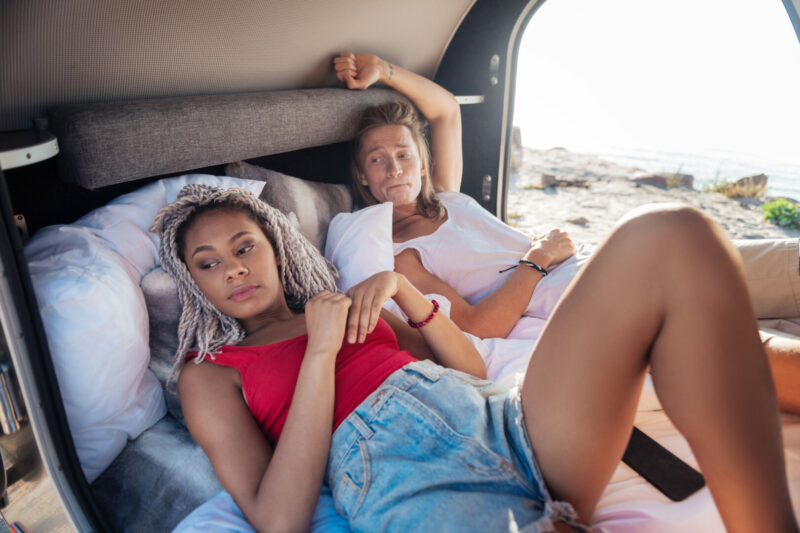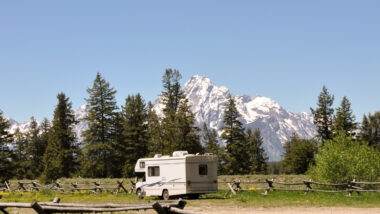Table of Contents Show
Every day the Internet sprouts countless blogs, YouTube videos, and Instagram posts touting the magnificence of RV living. You’ll read common captions like:
“We sold everything to live in an RV and travel the world!”
“We’re living in an RV and road schooling our kids!”
“This gorgeous vista is the view from my van this morning!”
Indeed, there are many benefits to living in an RV, but what about the downsides? You have to dig a little deeper into these social media profiles to find the downsides of full-time RV life.
Today, we’re going to spill the beans on the dark side of RV living. Read on!
Can You Live Permanently in an RV?
Yes, thousands of people across the country live permanently in their RVs. Some choose to embrace the nomadic lifestyle and travel in their RV, and others have parked in a permanent spot. The beauty of RV life is that there’s no one-size-fits-all style of RV living.
If you’re planning to stay stationary in your RV and you’re going to want to check into the legality of doing so. Even if you own the land, some counties and other governing agencies have restrictions for what they consider a residence or may strictly prohibit living in an RV.
You don’t want code enforcement to come knocking at your RV door!
What Is RV Living Really Like?
Most RVers experience many emotions on their travels, from reveling in stunning ocean views to worrying about the smell coming from their tank storage.
RV living is full of adventure, and most of them are incredible! But they’re not always fun. When you drive your home from place to place and must find a place to park at night, you’re vulnerable to challenging experiences as well as excitement.
Your “house” could blow a tire, you could run out of water, or your roof could spring a leak that’s difficult to find. While the ever-changing scenery is a big plus, being stranded on the side of the road never is.
While some days are Instagram-worthy, others are challenging at best and just plain discouraging at times.
Benefits of Living in an RV
The joys of RV life are many. There’s a sense of freedom in moving from place to place at a moment’s notice in your tiny house on wheels. Like a turtle carrying his life on his back, a full-time RVer carries the necessities of life at all times, opening a world of opportunities.
No packing necessary, no flight arrangements, no long-term planning. This level of freedom is phenomenal in itself.
Every day there’s an opportunity for more adventure and experience, all while embracing a minimalist’s existence. RV living removes the tethers of “stuff,” exchanging a life of attachment to things for one full of experiences.
You can replace your old life and rigid schedules with the spirit of the moment, and a whim can move you from the beach to the mountains within hours.
While most of us live a relatively traditional lifestyle in the same spot from day to day, there’s an allure to being on the move. It can offer a release from monotony and the expectation of following daily routines.
This is precisely why full-time RVers’ blogs, YouTube channels, and Instagram accounts are so popular. We long for adventure to some degree, along with freedom starting in childhood and extending through the elder years.
Those who can not or choose not to take to the open road live vicariously through the blogs and channels of full-time RVers. The adventure is entertaining, and for many, it satisfies the longing for existential freedom in the souls of the static ones.

Worst Things About Living in an RV
But are those committed to RV living wishing they were static at times? Do they long for a sticks-and-bricks home with a washing machine, a large refrigerator, and plenty of hot water at the touch of a tap? Let’s look at some of the things RVers dread most about being on the road.
1. Laundry Day
We all have laundry. Every day there’s more laundry. If we toss in a load, there’s less laundry. But when you live on the road, “tossing in a load” is not so simple!
While there are Class A motorhomes with washers and dryers, most RV living takes place in rigs without such a luxury. So, how does a family routinely deal with laundry when living the RV life?
There are pretty much two options. One is a bucket of soapy water (that becomes dirty quickly) and a bucket of fresh rinsing water (that becomes soapy quickly) followed by a clothesline of some sort.
The second is a laundromat. Neither is enticing. No one wants to talk about it, so let’s get it out of the way upfront: laundromats are gross.
Laundromats are also fabulous. What would we do without laundromats? When your washer breaks and your six-year-old throws up in bed, who ya gonna call? Vomitbusters? No. You’re bound for the local laundromat.
Thank goodness for laundromats then, right? But therein also lies the issue. Laundromats are full of other people’s “stuff.” And exposure to other people’s “stuff,” even when soap is involved, can be gross.
The other issue is time. What do you do while you wait for the laundry and drying cycles to complete? Worse yet, what do you do with your children while you wait for the laundry and drying cycles to complete?
“Laundry day” truly becomes laundry DAY. Today we’ll spend the day engaged in the process of doing laundry. For the rest of the day, you’ll be sorting clothes, counting quarters, and moving laundry from one machine to another.
So yeah. Laundry is among the worst things about living in an RV.

2. Constant Maintenance
When you drive your house over hill and dale, across bumpy roads, hauling the total weight of all the people and elements of your daily life, things happen.
Vehicle parts wear out faster, house parts come loose or fall apart, and there’s always a maintenance issue to tend to. It’s annoying, it’s expensive, it’s interruptive, and it’s always inconvenient.
If you live in a sticks-and-bricks house and your vehicle needs repair, you can wait comfortably at home until the repairs are complete.
But what if your vehicle is also your home? Suppose your rig needs to be on a lift for hours or even days! Do you continue to live in the rig up on the hoist? No! You have to find a place to stay, and if the repair won’t be complete for several days or longer, you can find yourself in a real jam.
But even when your rig requires maintenance you’re capable of completing yourself, there can be great inconveniences involved. Where will you park while you tend to the maintenance issues? Suppose no local shop has a necessary part in stock, and you have to order it? Suppose your “black tank” (wastewater tank) is leaking and needs repair?
Your house and vehicle’s maintenance issues are an RV headache, and it can hit when you least expect it.
3. Tiny RV Showers and Scary Campground Bathrooms
Oh, the joys of a nice, hot shower. Many of us take this luxury for granted daily. While it seems simple to enjoy a long, cleansing experience in hot water, RV living doesn’t always provide such pleasures.
When you’re boondocking, RV life means tank capacity and power storage limit your shower time. But even with full hook-ups, RV showers are still small! Some Class B RVs and many other campers don’t have an indoor shower. If they do, it might extend into the central aisle of the RV!
For these reasons, many RVers use public campground showers. Sometimes, these showers are well cleaned and perfectly acceptable. But other times, not so much!
Let’s face it: Showering in a stall where scores of strangers have showered before doesn’t hold the allure of a private home shower!

4. Loneliness and Lack of Community
Humans are social beings, and community is an integral part of thriving. Living on the road poses challenges on that front, especially for lone travelers. But it can also apply to couples and even families.
Many RVers travel in caravans or attend rallies and other gatherings with like-minded individuals to find some form of community.
It can be lonely on the road, even for introverts. If you’re having a rough time or are just plain tired emotionally and physically, you might long for companionship.
5. Trouble Maintaining Consistent Internet Connectivity
Internet connectivity has become a fundamental requirement for living. It keeps us connected, educated, and updated on news, weather, and other essential information.
For people who embrace RV living, a reliable wireless connection is imperative not only for personal reasons but also to make a living.
Non-retired, full-time RVers must often work to keep up the lifestyle. With all the advanced and ever-developing technology available in 2021, reliable Internet service can still evade you when you’re on the road.
You might have to schedule days in coffee shops or libraries to upload videos, download documents, and maintain reliable call and meeting connections. It’s even more difficult during the pandemic.
Many travelers pay for more than one cellular service to increase their connection. And even this is not a cure-all, so they rely on boosters, WiFi extenders, and other expensive connectivity solutions. It’s a repeated headache for RVers.

6. Decision Fatigue
Many RVers underestimate the number of decisions they’ll be making when living in an RV. This is especially true for those traveling full time in their RV. If you’re moving regularly, you’ll have a never-ending checklist running through your head of what needs to get done and in what order.
Moving from campsite to campsite is one thing, but towing a massive RV behind you compounds the fatigue even more. Planning your route and ensuring it’s safe and there are places to stop for fuel or bathroom breaks.
Decision fatigue is what shatters a lot of the idyllic dreams people have when it comes to RV full-time living. They don’t expect the immense stress making decisions can have on them, and they get overwhelmed. The next thing you know, they’re throwing in the towel and heading home.
7. It’s Getting Crowded Out There
It suffices to say that the last few years have been insane across the RV market. Manufacturers are breaking RV sales records quarter after quarter and are struggling to keep up with the demand from customers. We’ve heard of RVs selling before they even receive a VIN!
All of those RVs that manufacturers are cranking out belong to individuals and families who want to use them. Whether they’re planning weekend trips or traveling full time in their RV, campgrounds (and some of the best boondocking sites) are getting crowded.
Many weekenders or folks with limited vacation time find planning ahead to be fun. An upcoming RV trip is something to look forward to! However, when you live in an RV full time, planning ahead can be tedious. Spending time month after month, even year after year, planning where to stay gets old.

8. Lack of Privacy
Everybody loves their privacy. However, the lack of privacy in an RV can take its toll on you. The walls of your RV are thin, and you’ll hear your neighbors laughing or listening to music. Many RVers have a single bathroom for everyone in the family or any guests. The tight living space can make it challenging to get alone time to relax. It can feel like there’s always someone right next to you or within earshot.
Just like in a home, you’ll have good neighbors and bad neighbors. While most RVers are quiet and courteous, you’ll eventually run into someone who just isn’t a happy camper and may even encroach on your space. Just look at the different RV Facebook Groups to see complaints from real RVers all over the US.
9. It Can Be Expensive
If you thought the expensive purchases were over when you bought your RV, you were wrong. There’s always something to buy for the RV, your tow vehicle, or campsite fees to pay.
If those aren’t enough, you also have to deal with paying for routine maintenance and navigate those pains at the fuel pump that never seem to get any better.
It’s not a question of if something will go wrong with your RV, it’s when. If you own an RV for any time and use it, something is bound to break. If you can’t fix it yourself, some RV repair shops charge $150 to $200 per hour for their labor rate.
Not only that but if you want to have adventures while living the RV life, you’ll be spending more on dining out, experiences, souvenirs, and more. There are ways to save money while RVing but you have be very determined to do so.
Many folks look at the RV lifestyle because they think it’s a good way to save money. While this can be true, it’s not as cheap as you might think. Additionally, it’s a good idea to save enough money for a healthy emergency fund in place to take care of these unexpected RVing expenses.
10. Limited Space
You may have walked into your first RV and thought it was massive. However, cram a bunch of your possessions and your family in it for days, weeks, or months on end, and you’ll likely change your mind. That same RV camper that felt massive now feels slightly claustrophobic with its small space.
Even the largest RVs are rarely larger than 340 to 350 square feet. Would you consider moving into a house or apartment that was 350 square feet? Likely not.
The average size house built these days hovers around 2300 square feet. That means the largest RVs are 147% smaller than the average house.
The small space can get overwhelming at times, especially when the weather doesn’t cooperate and you are stuck inside for days on end.

11. Never Being in a Familiar City
When traveling in your RV camper, you have to learn the layout of a new city at every stop. This means you might need to do additional planning when you’re out running errands to avoid backtracking and taking more time than necessary. When driving in unfamiliar areas, always be mindful of one-way roads and any unique traffic laws.
Another tricky thing about unfamiliar cities is that you may learn that your favorite place to shop or grab fast food isn’t in every region. You can love Tim Horton’s Coffee, In-N-Out, or Whataburger, but they’re not available just anywhere. You’ll have to settle for your second or third place option sometimes.
12. The Stress of Travel Days
Packing up your entire house and moving it from point A to point B isn’t an easy task. We highly recommend using a detailed checklist to help you avoid making any mistakes or leaving anything behind.
You need to plan your route to avoid any issues during the travel day. Towing a massive RV behind you is stressful, and you don’t want to be trying to read a map or figure out the route on the fly.
You also don’t want to take your RV into any areas you’re not sure you’ll fit. You can get yourself into a sticky situation with bridges and low clearances if you don’t research the route. Not only will it be stressful for you, but any other drivers will be inconvenienced by your lack of planning.
13. Timing Packages and Mail
When you’re stationary, it can be easy to jump online and order practically anything you need and have it show up on your doorstep in a day or two. However, when you’re on the road and moving every few days, you have to time it just right to purchase things online.
Some campgrounds are more flexible with allowing guests to receive packages, so always make sure you check with the campground before placing your order.

Why Do People Quit RV Full-Time Living?
People quit the full-time RV lifestyle for a variety of reasons. However, we see many RVers who set off not prepared for life on the road or with unrealistic expectations.
You can’t just quit your job and expect that your social media or YouTube channel will skyrocket and pay the bills. You have to have a solid financial plan for making money on the road or a plan for how you’ll fund your travels before you hit the road.
It’s hard to see RVers throw in the towel because of their unrealistic expectations. If you had an unhealthy relationship with a partner or spouse, hitting the road isn’t going to fix your relationship overnight.
Can RVing improve your relationships? Absolutely. However, it takes a lot of hard teamwork. Doing hard things together can bring you and your loved ones closer together if you do them together and have patience with one another.
Is RV Living Really Worth It?
If you’ve read our list and can’t imagine living with those downsides, RV full-time living might not feel worth it for you. You have to determine what’s best for your own life and preferences.
If you’ve never RVed before, we highly recommend getting an RV rental and testing a few out. RV owners who did this before buying their first recreational vehicle say they were able to test out different floorplans and sizes before making their final decision.
Try out a fifth wheel in one location then test a class C RV for the weekend at another. Getting a feel for the different RV types can help you determine if the RV lifestyle is for you.
But for many people, RV living is a path to freedom and personal fulfillment. The benefits outweigh the downsides, and they can’t get enough. Personally, we fall into the latter. How about you?







We are full-time for more than 6 years. We live in a 38 foot class A. Not a million dollar bus. But we have a washer/dryer, air conditioning, unlimited ( but often really slow or non existent internet.) I do most of my own maintenance on a very rigid schedule and have budgeted for repairs without delay. This week getting foggy Windows replaced. I am not lonely because I am always willing to walk to my neighbor and compliment his/her rv,no matter of a pop-up or prevost. Or see a neighbor fixing something and offer to help. Life is good.
Great article! We are looking forward to the lifestyle but we have a firm list of things we want, this article totally reminded me of why. Hint #1
Thanks
We full timed for 5 years and 5 years summers. Wouldn’t have missed those magical years. Both of us were 65, in good health, and purchased a maintenance contract with a new rv. Each day was a new adventure. We bought a Thousand Trails membership from a retiring couple with health problems. The contract included many advantages, so we could camp for 2 weeks in Panama City Beach when move to the Navy Famcamp for a week/2 and back to the secondary site. We spent the summers mostly on the Oregon Coast and winters in Panama Ciry Beach. My ONLY regret was the need to do laundry in rarely great facilities. DON’T MISS THE MEMORIES. GO!
If you’re rv runs an you k now how to drive it and are not disabled it might be great but after almost two years it’s hell on wheels
We have been full time for 18 months now. 28 foot 2006 travel trailer we bought for almost nothing and remodeled from new subflooring up. Tore out all the original furniture and reconfigured the floor plan to suit us. Took 3 months of experienced DIY work and total investment was under $7000 cash. Wish we had done this YEARS ago!
My number one thing that has made it this comfortable and fun… Installing a real apartment size washing machine. It’s 36 inches tall and 2 feet by feet in the floor top loader. Connects to our sink when in use and weighs 65lbs. No laundromats EVER. Clothes hang out to dry on our portable dog fence in the sun. You don’t need a $100,000 motorhome to live in a civilized manner….just creative planning and a willingness to sacrifice some floor space.
As for internet connection.. we have an unlimited wifi hotspot and second backup cell service for cell equipped tablets and phones. Never had a spot without some service even in Big Bend National Park. Costs a pretty penny, but reliable, private, fast connection is the result.
We have been living in our RV for a year. Mainly staying in one RV resort, but have taken many week to 2 week trips. We don’t boondock at all. Always stay in a RV park, be it thousand trails or a small mom and pop park. For laundry issues, first thing my wife does when we pull into a new area, she searches for a laundry service. Some place we can just drop our laundry off, they wash and fold. We pick it up and put it away. We average about $30.00 a week for laundry service.
This is a great list! Some of the things I wasn’t prepared for was the loneliness, being in unfamiliar places all the time while still doing normal things like laundry and shopping, decision fatigue and all the long hours of planning out travel and making reservations, and anxiety while towing on travel days. But it is still worth it!!
Guys truly need help deciding. Sell my home and go full time with my autistic son and my crazy sister, rent my home out, maybe put a pad there….
So much to think about. I have disabling depression and I’ve never been depressed while traveling. I love puzzles, and board games etc. and I’ve kinda become a hermit a bit. So rv’ing sounds like my magic trick!!!
But my what if’s are scary. HELP!!
Need to know if rv’ers are truly a family and could help out with maintenance ( pointing me to the right person to do repairs or helping me simply by knowing what to “if”. Bring a single mom with and autistic son….
Help!!!